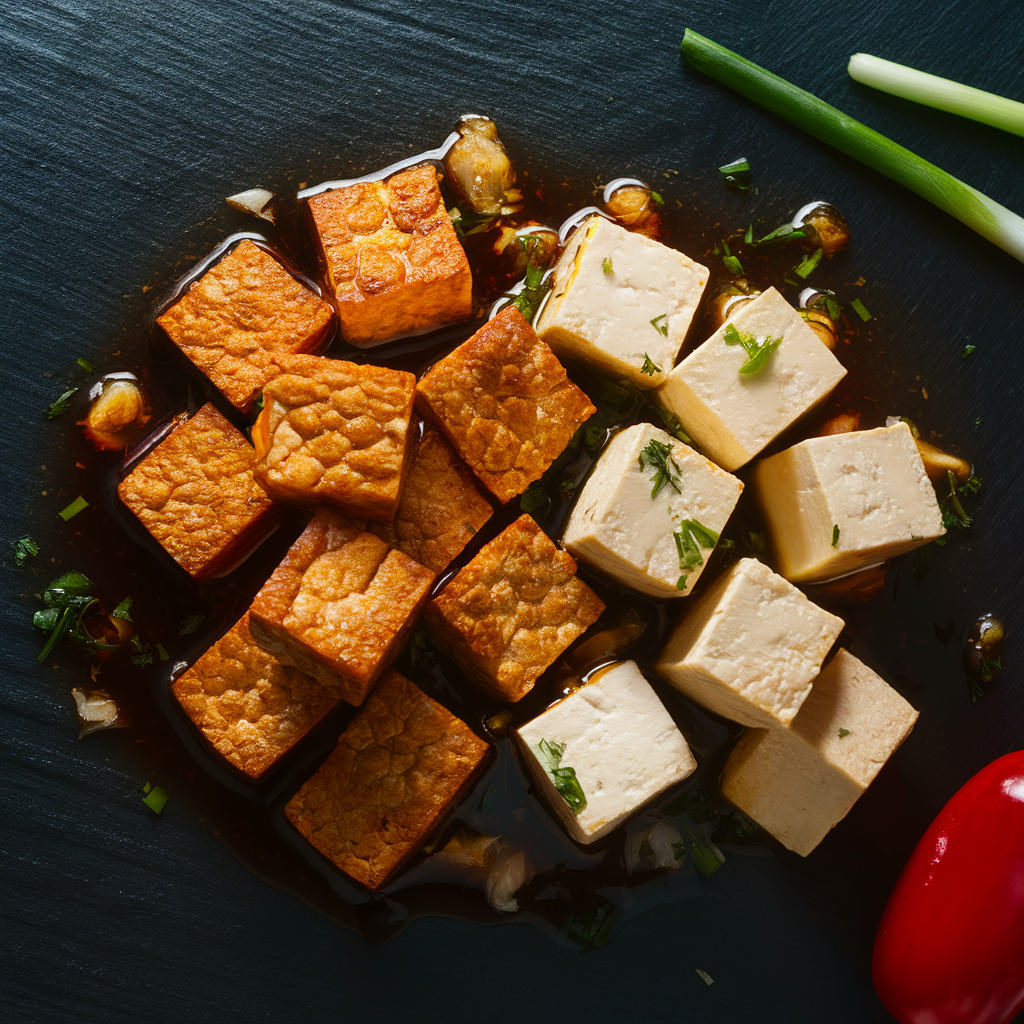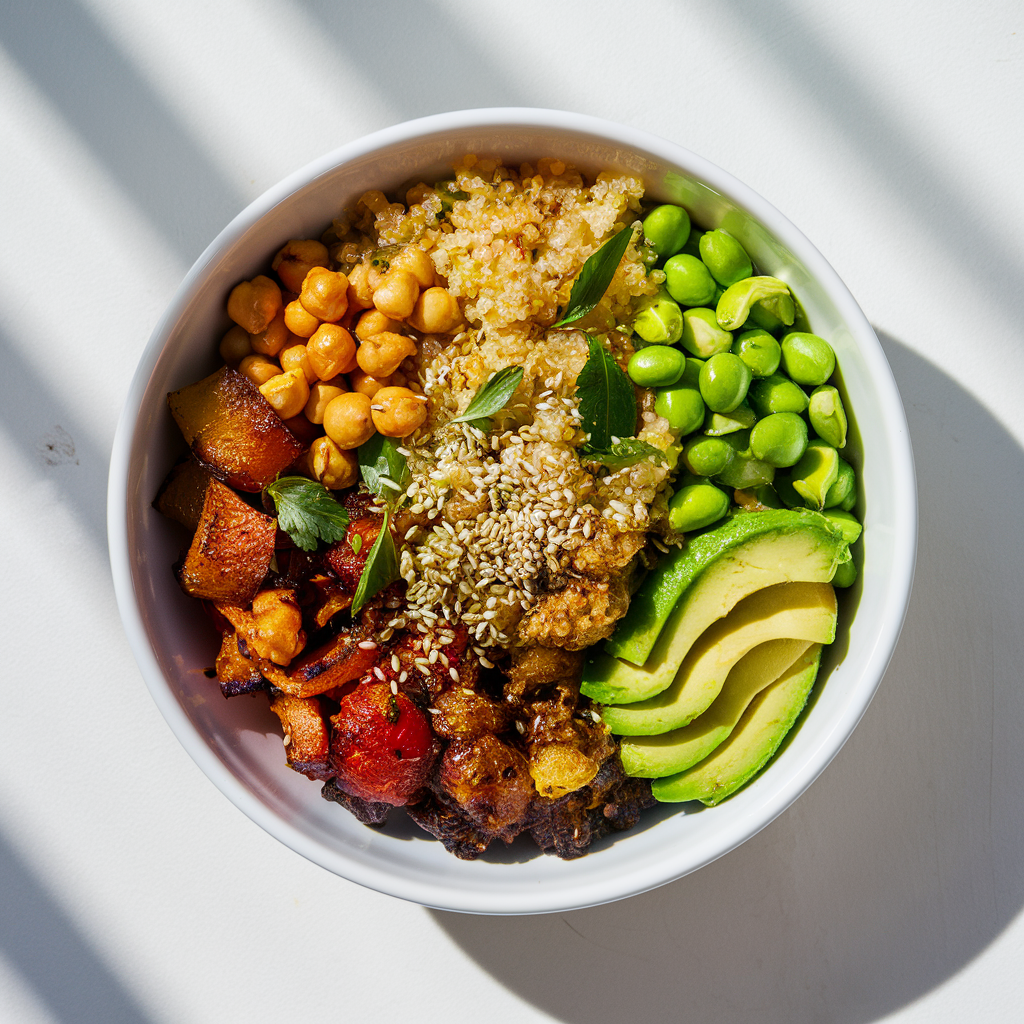Getting enough protein on a vegan diet is easier than you might think. Whether you’re a long-time vegan or just beginning to explore plant-based eating, incorporating high-protein foods is essential for muscle maintenance, satiety, and overall health. This comprehensive guide explores seven protein-packed plant foods that can help vegans meet their nutritional needs without compromising on taste or variety.
Why Protein Matters on a Vegan Diet
Protein is a crucial macronutrient that serves as a building block for muscles, tissues, and enzymes. For vegans, finding complete protein sources (containing all nine essential amino acids) requires some strategic food choices.
The average adult needs approximately 0.8 grams of protein per kilogram of body weight daily, though active individuals, pregnant women, and older adults may require more. Contrary to common misconceptions, plant-based diets can easily provide sufficient protein when properly planned.

1. Legumes: The Protein Powerhouses
Legumes represent one of the most nutrient-dense and protein-rich plant food categories available to vegans.
Lentils
With approximately 18 grams of protein per cooked cup, lentils stand out as a protein superstar. These versatile legumes come in various colors—red, green, brown, and black—each with slightly different cooking times and textures.
Beyond protein, lentils provide:
- Iron (essential for vegans)
- Folate
- Fiber (around 15 grams per cup)
- Complex carbohydrates for sustained energy
Lentils shine in soups, curries, salads, and even plant-based burger patties. Red lentils cook quickly (in about 20 minutes) and are perfect for creamy dals, while green and brown varieties hold their shape better for salads and side dishes.
Chickpeas
Offering around 15 grams of protein per cooked cup, chickpeas (garbanzo beans) are incredibly versatile. Their nutty flavor and firm texture make them suitable for countless preparations:
- Hummus and other dips
- Roasted as a crunchy snack
- Added to salads and bowls
- Transformed into plant-based meatballs
- Used in curries and stews
Chickpeas also provide significant amounts of manganese, folate, copper, and fiber. The aquafaba (chickpea cooking liquid) serves as an excellent egg replacer in vegan baking.
2. Tofu, Tempeh, and Other Soy Products
Soy-based foods are among the few plant sources that provide complete proteins, containing all essential amino acids.
Tofu
This versatile soy product contains approximately 20 grams of protein per cup. Available in different textures (silken, soft, firm, extra-firm), tofu adapts to nearly any dish:
- Scrambled for breakfast
- Grilled for sandwiches
- Blended into creamy desserts
- Cubed for stir-fries
- Marinated for maximum flavor absorption
Tofu is also rich in calcium (especially when calcium-set), iron, and manganese. Its mild flavor makes it an excellent canvas for various seasonings and cooking methods.
Tempeh
With an impressive 31 grams of protein per cup, tempeh offers even more protein than tofu. This fermented soy product has a firmer texture and nuttier flavor, making it excellent for:
- Slicing and grilling as sandwiches
- Crumbling into chili or tacos
- Marinating and baking
- Adding to stir-fries
The fermentation process increases tempeh’s digestibility and creates beneficial probiotics. It also provides significant amounts of riboflavin, magnesium, and phosphorus.

3. Seitan: The Plant Protein Powerhouse
Made from vital wheat gluten, seitan contains about 25 grams of protein per 3.5 ounces, making it one of the most protein-dense plant foods available.
Its chewy, meat-like texture has earned it nicknames like “wheat meat” and made it popular in plant-based versions of:
- Deli slices
- Steaks
- Sausages
- Stir-fry strips
Seitan absorbs flavors extremely well and holds up to various cooking methods including grilling, sautéing, and baking. It’s particularly valuable for creating meat-like textures in vegan cuisine.
Note that seitan is not suitable for those with gluten intolerance or celiac disease, as it’s almost entirely composed of gluten.
4. Nutritional Yeast: A Protein-Rich Flavor Enhancer
This deactivated yeast provides 8 grams of protein per 1/4 cup and has become a staple in vegan kitchens for its cheese-like, umami flavor.
Beyond protein, nutritional yeast (often called “nooch”) offers:
- Complete protein with all nine essential amino acids
- B vitamins (many brands are fortified with B12, crucial for vegans)
- Zinc and selenium
Its versatility makes it perfect for:
- Sprinkling on popcorn or roasted vegetables
- Creating vegan “cheese” sauces
- Adding to mashed potatoes
- Incorporating into salad dressings
- Thickening and flavoring soups
5. Quinoa: The Ancient Grain with Complete Protein
Unlike most grains, quinoa provides all nine essential amino acids, making it a complete protein source with about 8 grams per cooked cup.
This ancient grain (technically a seed) comes in various colors—white, red, black, and tricolor—with similar nutritional profiles but slightly different textures and cooking times.
Quinoa’s versatility makes it suitable for:
- Breakfast porridge with fruits and nuts
- Side dishes in place of rice
- Salad bases
- Veggie burger ingredients
- Bowl foundations
It also provides significant amounts of manganese, magnesium, phosphorus, and folate, along with a good dose of fiber.
6. Hemp Seeds: Tiny Seeds with Powerful Nutrition
Hemp seeds pack an impressive 10 grams of protein in just 3 tablespoons. These small but mighty seeds offer:
- Complete protein with all essential amino acids
- Ideal omega-3 to omega-6 fatty acid ratio
- Vitamin E
- Phosphorus, potassium, and magnesium
Their mild, nutty flavor makes hemp seeds easy to incorporate into:
- Smoothies
- Oatmeal
- Salads
- Homemade energy bars
- Plant-based yogurt
Unlike some other seeds, hemp seeds don’t require grinding to access their nutrients, making them a convenient protein addition to any meal.

7. Edamame and Green Peas: Protein-Packed Vegetables
Edamame
These young soybeans contain about 17 grams of protein per cup. Usually served steamed and lightly salted, edamame makes a perfect snack or addition to:
- Stir-fries
- Grain bowls
- Salads
- Noodle dishes
- Dips and spreads
Edamame also provides calcium, iron, vitamin K, and fiber—making it a nutritional powerhouse.
Green Peas
Often overlooked, green peas contain nearly 9 grams of protein per cooked cup. These sweet, versatile legumes can be:
- Added to pastas and risottos
- Blended into dips and spreads
- Incorporated into plant-based patties
- Mixed into grain salads
- Made into pea protein-based milk alternatives
Green peas are also rich in vitamins A, C, K, and various B vitamins, along with manganese and dietary fiber.
Creating Balanced Vegan Meals with Protein Variety
For optimal nutrition, mix and match these protein sources throughout your day:
Breakfast Options
- Tofu scramble with nutritional yeast
- Quinoa breakfast bowl with hemp seeds
- Smoothie with plant protein powder and nut butter
Lunch Ideas
- Lentil soup with a side of whole grain bread
- Buddha bowl with quinoa, edamame, and roasted chickpeas
- Tempeh sandwich with avocado
Dinner Suggestions
- Stir-fry with seitan, edamame, and brown rice
- Chickpea curry with quinoa
- Pasta with lentil bolognese and nutritional yeast “parmesan”
Snack Possibilities
- Hummus with vegetable sticks
- Roasted chickpeas
- Energy balls made with hemp seeds
Tips for Maximizing Protein Absorption
To get the most from these plant protein sources:
- Pair complementary proteins throughout the day (beans with rice, hummus with pita)
- Sprout or soak legumes and grains when possible to enhance digestibility
- Include vitamin C-rich foods with iron-containing plant proteins to boost iron absorption
- Consider fermented options like tempeh for improved nutrient availability
- Stay hydrated to support protein metabolism and digestion
Conclusion: Thriving on Plant Protein
These seven protein sources demonstrate that vegans can easily meet—and even exceed—their protein requirements through delicious, versatile foods. By incorporating a variety of these options daily, plant-based eaters can build and maintain muscle, support immune function, and enjoy optimal health without animal products.
Whether you’re a lifelong vegan, a new plant-based eater, or someone looking to reduce animal product consumption, these protein-rich options provide a foundation for nutritious, satisfying meals that support your health and ethical choices.